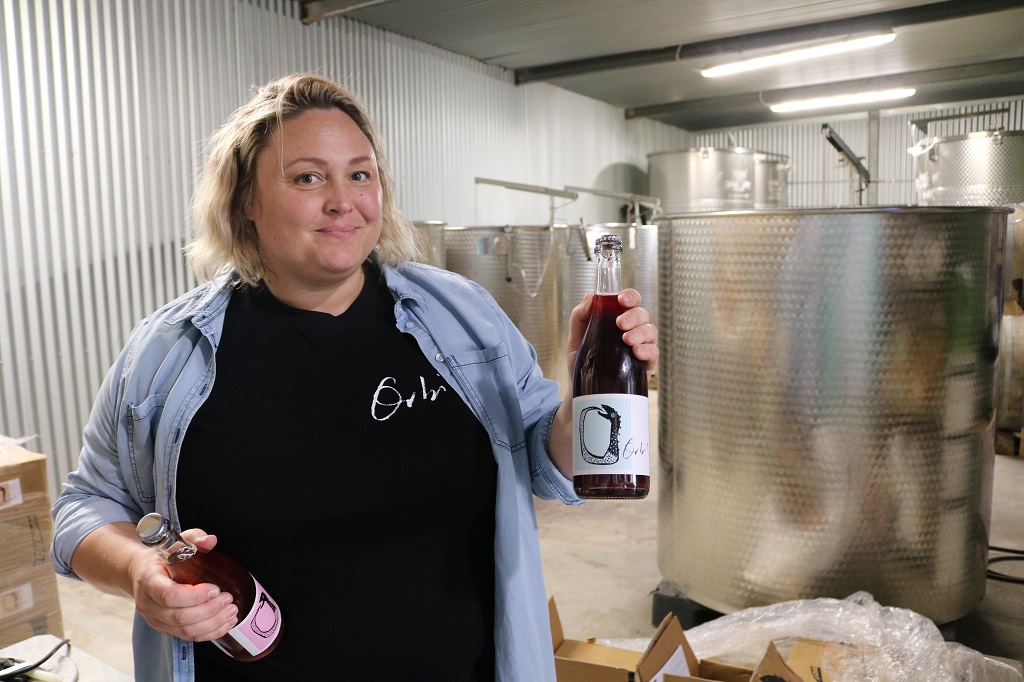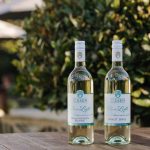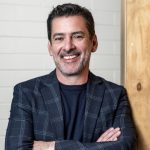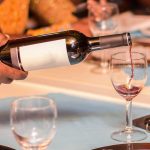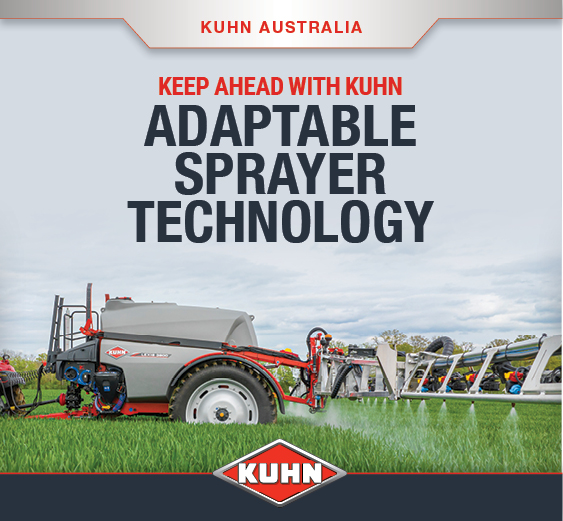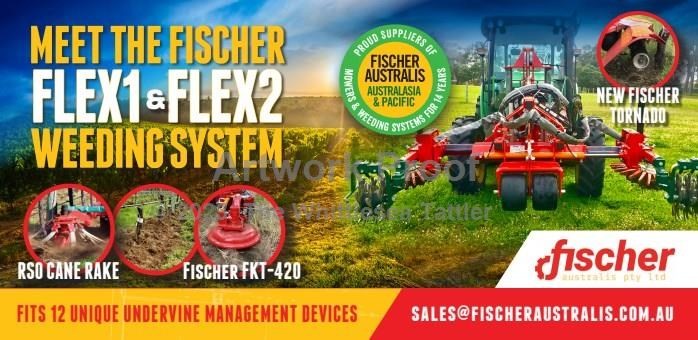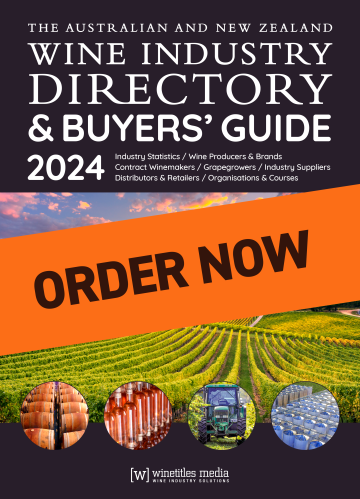Lauren Langfield, head winemaker and general manager at Orbis Wines. Photo: Meg Riley
by Meg Riley
When Lauren first set foot in a vineyard she didn’t even have a driver’s license. Six months later, she was enrolled in a diploma of viticulture and winemaking at university, driving tractors and reversing trailers unsupervised. Now, she’s heading up Orbis Wines as both general manager and head winemaker and is making strides in sustainability. In 2023, Orbis won the South Australia Wine Industry Association’s Environmental Excellence Award for the small to medium category, and Lauren collected the Young Gun of Wine award to boot. She spoke to journalist Meg Riley to tell her story.
Nestled among large eucalyptus trees in McLaren Vale, the vineyard at Orbis Wines is strikingly quiet. Even as Lauren Langfield takes off on a tour through the vines, the ATV barely makes a sound: the whole place is entirely off-grid.
Prior to her career in the wine industry, Lauren was a self-described “city girl”. Now, running the vineyard and winery at eco-neutral Orbis Wines, Lauren couldn’t be further from that descriptor. With a focus on low-intervention farming and winemaking, she has made her (environmentally friendly) mark in the wine world, most recently winning the Young Gun of Wine award in 2023.

Growing up in New Zealand, Lauren spent two and a half years in a fashion degree before realising it wasn’t for her and picking up a vineyard job in the interim. She didn’t come from a “wine family”, so it wasn’t until her father began accounting work for a winery that Lauren first stepped into a vineyard. Bitten by the good kind of vineyard bug, she hasn’t left since, and is doing everything she can to ensure that her footprint is as minimal as possible.
Following her love of viticulture to Australia, Lauren began working at William Downie Wines, a winery in Gippsland with challenging hills, high-density plantings, and a devotion to organics. Because the vine rows were so close together – less than one metre apart – Lauren had to learn how to rein a horse with a spray cart in order to spray the vineyard.
“Until we got the horse working, there was a point where I was backpack spraying the vineyard and carrying prunings out of the rows,” said Lauren. “So it was a definite labour of love.”
Although Lauren came from New Zealand with a pre-existing passion for organic and biodynamic farming, her experience at William Downie only cemented this dedication further. It also piqued her interest in the winemaking side of the equation. Soon after, she landed a job as assistant winemaker at BK wines, and the rest was history.
“I think when you have spent so long working in viticulture, your understanding of grapes and flavour and what it is you need to do in the vineyard to then create great wine – that’s the hard part,” said Lauren.
“Because it all comes down to: if you’ve grown good fruit, you’re going to make good wine.”
This holistic understanding of the importance of growing good grapes leads Lauren’s winemaking choices, not just in the winery, but also when it comes to selecting varieties.
“We are trialling lots of new alternatives, because the commitment for Orbis is about how can we reduce our demands on water? How can we protect water resources?”
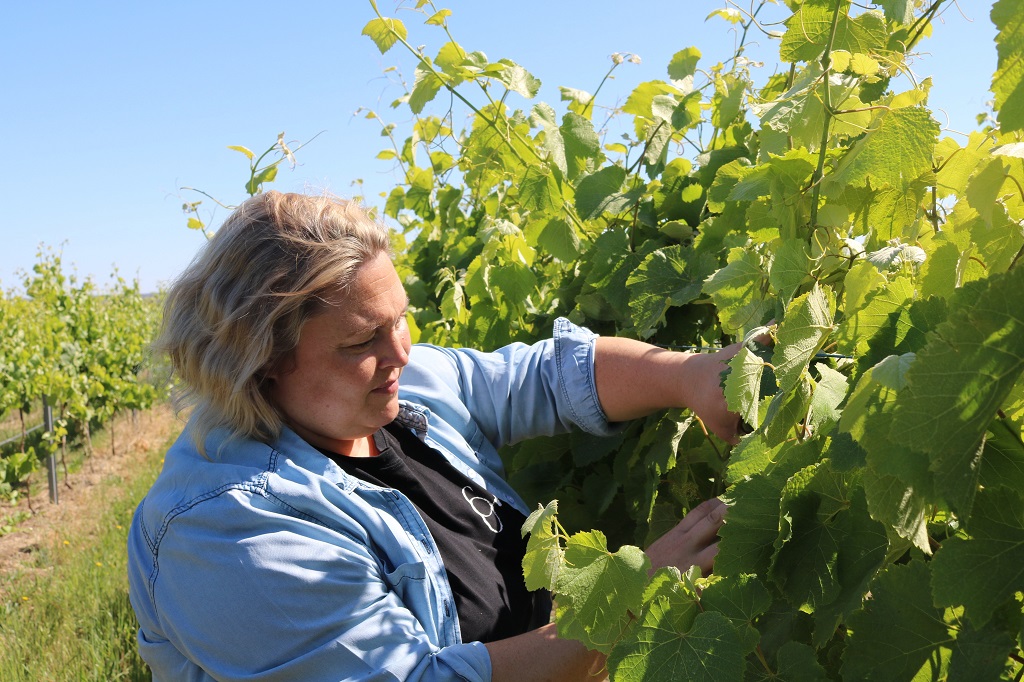
The art of the “educated guess”
With a focus on climate suitability in order to optimise yield quality, Lauren takes a multitude of factors into account when evaluating potential plantings, not least because the climate itself is changing.
“What do we need to anticipate?” she asks. “How can we grow fruit that is more appropriate to the changing climate?”
“Looking at drought resistance [and] tolerance, and also disease tolerance too – are there ways we can pick varieties that won’t require as much spray as more traditional varieties?”
Like many of her peers, Lauren is also in search of varieties that lend themselves to NoLo tastes.
The burgeoning NoLo demand requires specific qualities in a grape variety, leading Lauren to search for varieties that uphold their natural acidity. This results in wines which are “lighter alcohol and more bright and fruit driven,” which meets her understanding of what consumers are looking for.
There is no one region that is a perfect match for the climes of McLaren Vale, Lauren explains, although she said she does tend to pick vines from other coastal regions when selecting new varieties.
“It’s also been a little bit about what wines we like to drink too. We love drinking Albariño, we love Soave, so they were kind of an easy choice.”
“Like with everything in the wine industry, it’s [observing] trends, it’s trying to think ahead, trying to look at what’s going on […] it’s a little bit of making some educated guesses.”
Albariño is one of these “educated guesses” which has paid off immensely for Lauren.
“It’s got a salinity to it, the variety – it naturally shows this kind of brine character, which just makes you feel like you’re drinking wine by the ocean, and people seem to really like that.”
“It’s got great natural acidity, it’s able to ripen nice and slowly when it’s hot here. It’s also able to withstand heat spikes. And then also just the fact that it tastes really good, and people seem to be really enjoying those sorts of whites.
“What I did was actually leave it [the Albariño] to ripen a lot longer than normal. I let the sugar creep up a bit higher […] the fruit turned this beautiful golden, honeyed character. It looked beautiful on the vine in terms of actual visual as well as eating, because it had this lovely honeyed, golden character but still had the acidity which supported it, so I wanted to see how far I could go with that point where the acid and the sugar would get that nice meeting point.”
Natural decisions
When it comes to a winemaking philosophy, Lauren said everything stems from her roots in the vineyard.
“It’s [having] that respect for the fruit and being able to be a winemaker where I can intervene in the vineyard stage, so that we’re not having to make decisions in the winery that should have been made much sooner. And so really, by the time it comes to the winemaking, we’ve grown fruit well, I don’t need to do much.”
“We [Orbis Wines] are a small brand, and we’re an estate brand, and we’re a small team, so we all get involved with everything. I suppose that’s my philosophy, is that I’d always want to work in a business like this [where] you are involved in all elements of it.”
Being so closely involved in the early stages allows Lauren to keep her winemaking approach light.
“We hand pick all of our fruit here at Orbis, so everything that comes to me in the winery, it’s looking beautiful, it’s pristine fruit. We’re naturally fermenting wines, so we’re not adding yeasts. And when we’re making wines which have natural acidity, we don’t have to make any additions like in traditional winemaking.”
“A lot of my wine is whole bunch pressed wines, and that’s because I really like to make quite [a] textured style of wine. I’m not too afraid of skin tannin with whites and also leaving wines on lees, so building up some texture through that complexity coming from extended lees contact.”
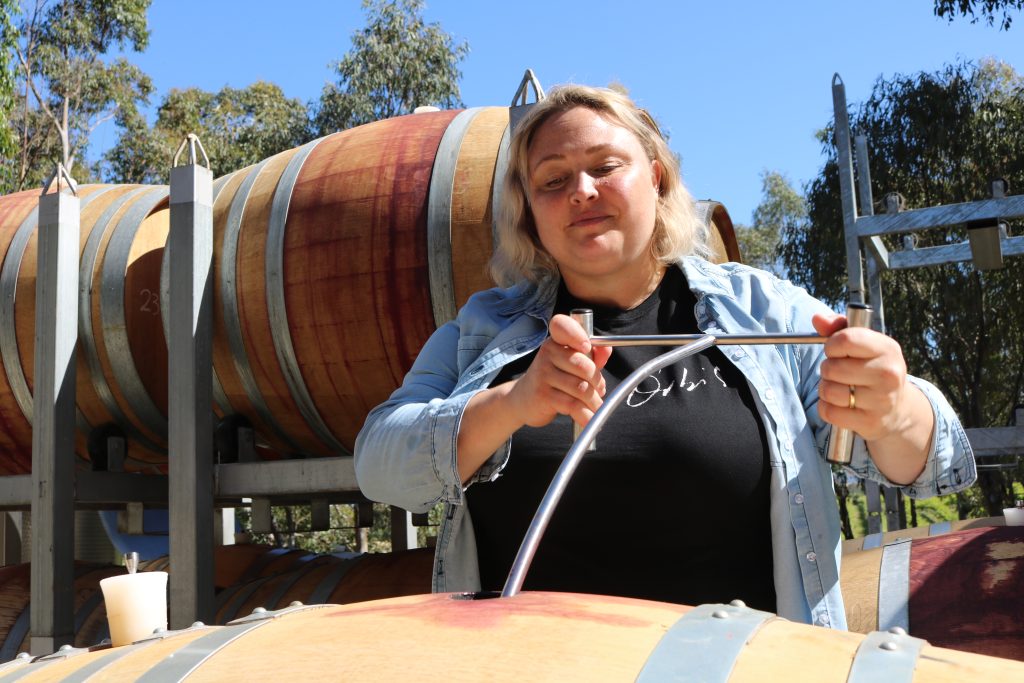
“We also make wines that go through full malo [malolactic fermentation], so generally speaking, most of them are much more textural food-friendly style wines […] probably just replicating how I would make a Chardonnay with white, quite commonly.”
Last year, she made Orbis’s first Fiano, also approaching the process similarly to how she would a Chardonnay, incorporating barrel maturation and time on lees – quite different to most Australian styles of Fiano.
“It was all mature oak,” Lauren explained, “but just to see, again, how that complexity and that lees contact and that movement of lees, how that would play out in the wine.”
“It’s interesting to see people play with what we can do with Fiano here in McLaren Vale, because we’re seeing a lot of planting of it here, and people [are] really becoming more familiar with McLaren Vale Fiano, so I think we’ve got a space where we can play around with it and see what customers like.”
Off the grid and on a roll
Not only are Orbis’ vineyard and winery completely off-grid, but the team are also making efforts throughout the value chain to be as eco-conscious as possible.
“We are constantly building carbon. We’re not tilling, so we’re trying not to release atmospheric carbon. A lot of our decisions are asking about how are we locking carbon into the ground as much as possible?
This thoughtful dedication to detail may require a lot of care, however their immense efforts have not gone unrecognised.
Winning the SAWIA Environmental Excellence Award in 2023 is a great source of pride for the winery, and one that Lauren said demonstrates its commitment to the full picture of sustainability.
“We won the Environmental Excellence Award for the small to medium category, for the South Australian Wine Industry Association. And that’s because what we’re doing is across the full value chain for the brand.”
These careful decisions include using native hardwood from the property as end posts in the vineyard, or to build an extension onto the winery, and mixing the resulting sawdust into compost. They are also repurposing winery waste as compost, creating biochar from uprooted vines, and grazing Babydoll sheep as a means of managing the cover crops.
“When we’re planting the new varieties, we are only using the steel posts as our intermediate posts moving out, and then our end assemblies are being produced from native hardwood that’s grown here on site.”
Perfecting these innovations takes some fine tuning, and Lauren said they trialled a number of different techniques to extend the life of the hardwood.
“The first one was to burn the external part of the post, which was a charring process – it’s an ancient Japanese wood preservation method. So that’s about trying to make sure that the posts aren’t eaten by insects, and just extend their life a little bit longer.”

“We moved away from that, because it’s quite an intensive process to do it, and we’ve started dipping the wood in a caustic solution – another thing which is done to help to make sure we can extend their life.” Lauren noted that the hardwood end posts had proved to be a good solution, because the main damage they experience is tractor damage – which the hardwood is able to withstand well.
A recent extension to the winery was also built using hardwood from the property, which was milled on-site.
“Wood is a great building material because it’s sequestered carbon through its life,” explained Lauren.
At the other end of the process, Lauren is also taking precautions to make use of any waste they produce in the vineyard and winery alike.
“When we pull out vineyards, rather than doing the traditional method, which is just to burn all the vines and have a bonfire, we are making biochar with those vines. We have two biochar pits on the property and it’s a method where you need to get the fire very hot, and when you get that right temperature, the biochar is produced, which releases a lot less atmospheric carbon when it burns, and locks the carbon into this product.”
Biochar is a type of charcoal which can increase water retention in the vineyard and delay the speed of microbial decomposition when mixed with compost, making it an attractive addition to vineyard nutrients as it reduces the need for frequent fertiliser applications.
“We put that into our mulch and compost mix, [and] that goes back out into the yard. It also gets drilled in when we rip the soil for the new plantings,” said Lauren.
In and around the winery, much of the waste that is not avoided can be returned to the vines as compost.
“All the grape waste here stays on site. We compost that and that gets returned to the vineyard every year.
“Because we have the tenant here on the property who’s helping make the posts and any wood that we need, there’s naturally a load of sawdust that remains, so that goes into our mulch.
We’re looking at how we can use materials we have on the site, to put them back into the earth and make sure we’re keeping that circular economy going.”
With the goal to someday achieve full pasture cover, Lauren is currently grazing sheep in the vineyard to keep the cover crops at bay.
“All the new established vineyard is very tall, very high, and that’s because we’re growing it with the intention that our Babydoll sheep (when there is enough of them), that we will graze them permanently in the vineyard.”
“Right now, we’ve managed to extend the grazing period, so they can stay in for longer than the traditional winter grazing because they can’t reach the vines. But they can rub at the moment, so that’s why they’re not in the young vines.” Lauren added that this was something she learnt from trial and error.
While they are still building their flock of Babydoll sheep, they also bring Merinos in over winter, and have been using a system of “micro cells” to help manage and rotate where the sheep graze.
“We actually put sheet fencing through the vineyard so we can intensively farm, intensively graze the sheep. So they’re just in a small paddock for intensive lengths of time then we move them very rapidly, and we keep them moving constantly, rather than having them graze through large blocks. That’s been proven to be the most efficient way for the nutrient cycling.”
Winter does pose some added complications for Lauren when it comes to managing the power. As the winery is fully solar, it’s important that she prioritises where their energy goes, particularly on overcast days when the energy is limited.
“[In] winter I have to really manage the power. If I’m cold stabilising, using a fair bit of power, I just need to make sure that we’re not plugging other things in when there’s no sun. It’s just that length of time from when the sun goes down to sun coming up which is the main limiting factor.”
“We have batteries that we can run through the night as long as we get to full charge by the evening. But if the day’s been a bit cloudy then we just have to be careful.”
This might mean forgoing charging the forklift overnight or waiting until the morning to recharge the ATV.
Packaging decisions are also made thoughtfully, of which the lightweight glass bottles and recycled paper labels are just the tip of the iceberg: even the pallet wrap and tape are biodegradable.
“We use cork on our bottles instead of crown caps, because corks come with a sort of a certificate to prove how much carbon was sequestered through the production of the cork, with it being a tree,” explained Lauren. “And caps are opposite. But also, people don’t know they have to remove the collar on their bottle to actually recycle it.”
In South Australia, Orbis they also offering a take-back system, where they bring the glass wine bottles back to the winery.
“We haven’t fully resolved the system yet, but we offer that service now, and we’d like to work out how we’re going to rewash the bottles and reuse them.”
“It’s just those small decisions about how we package the line and all those extra things that we spend money on, making sure that we’re making a decision which is a more responsible environmental choice.”
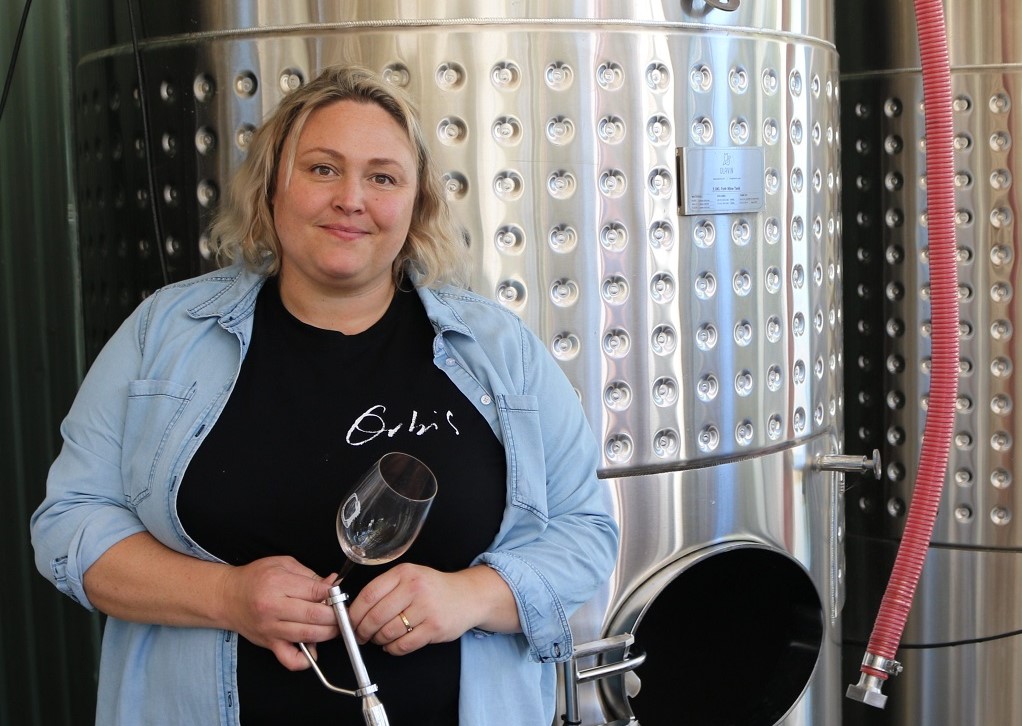
Young Gun of Wine
Is all the effort worth it? Lauren certainly thinks so.
“I love working in wine, I love the challenges that it does put us through every single day. And that’s probably what makes it so good, is that each day is so very different. McLaren Vale especially is a really great community, and since moving here, I can’t see myself moving away. There’s lots going on here and lots of things changing and [it’s an] exciting time to be in McLaren Vale.
“It’s a long journey. Pruning right through the whole season, making the wine, that whole length of time and then finally getting into bottle…every year seeing that journey and seeing people enjoy what you do for your job is pretty satisfying.
“It’s a really exciting industry and when you’re in it, gee, it’s fantastic. When it’s going well, it’s going really well.”
Among Lauren’s personal career highlights was winning the Young Gun of Wine in 2023.
“I’ve worked for people who have been in the competition and won and so to have that moment of ‘I managed to achieve that’ was a really, really proud moment,” she said.
“One of the proudest moments, I suppose, was making that first wine that I made for myself. That idea of seeing your name on a bottle and being proud that you’ve crafted something and then every time you release a wine now, you take a lot of pride in what you do, so to have people enjoy it and [to] see people enjoying your wine, that’s pretty special.”
As Lauren says, when it’s going well, it’s going really well, however there are some areas where the wine industry is still falling short.
“The wine industry has a long way to go with keeping younger women in the industry. It’s also got a long way to go with inclusivity and diversity. I’d love to see an industry where there is more diversity. Our industry is also pretty tricky at times with such seasonal work.”
“We’ve got a long way to go. We’ve got some challenges ahead [in] our industry with oversupply, and really making sure that we premiumise Australian wine, so making sure that internationally, our reputation remains as great quality wine.
“We have to be prepared to make changes, and understand that it’s not just climate that’s changing, it’s people. What do people want for Australian wine? And maybe what we’ve been doing isn’t exactly what we’ll be doing for much longer.”
Reference
Madden-Grey, Simone. “Biochar in the vineyard: building a foundation for sustainability. Australian & New Zealand Grapegrower & Winemaker 681, October 2020.
This article was originally published in the March issue of the Australian & New Zealand Grapegrower & Winemaker. To find out more about our monthly magazine, or to subscribe, click here!
Are you a Daily Wine News subscriber? If not, click here to join our mailing list. It’s free!
